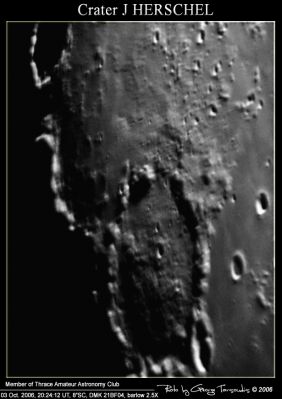Difference between revisions of "J. Herschel"
(Created page with "<div id="content_view" class="wiki" style="display: block"> =J. Herschel= {| class="wiki_table" | Lat: 62.0°N, Long: 42.0°W, Diam: 165 km, Depth: 0.9 km, [/R%C3%BCkl%202...") |
|||
| Line 41: | Line 41: | ||
<br /> | <br /> | ||
==LPOD Articles== | ==LPOD Articles== | ||
| − | [http:// | + | [http://www2.lpod.org/wiki/June_18,_2006 Oozing Ejecta]<br /> [http://lpod.wikispaces.com/March%2017%2C%202014 A Different Kind of Swirl]<br /> <br /> |
==Bibliography== | ==Bibliography== | ||
Revision as of 19:17, 11 April 2018
Contents
J. Herschel
|
Lat: 62.0°N, Long: 42.0°W, Diam: 165 km, Depth: 0.9 km, [/R%C3%BCkl%202 Rükl: 2] |
Table of Contents

George Tasroudis
Images
LPOD Photo Gallery Lunar Orbiter Images
- The 32th item in C. A. Wood's list of [/concentric%20crater Concentric Craters] (1978) is the one south-southeast of J. Herschel F. It is noticeable on the Hi-Res scan of Lunar Orbiter 4's photograph LOIV-152-h1. In this part of [/Mare%20Frigoris Mare Frigoris], near J. Herschel F (between [/La%20Condamine La Condamine] and J. Herschel), a curious field of twisted arc-shapes is noticeable. Among these twisted arc-shapes, several concentric craters (and possible concentric craters) have been detected. Research: Danny Caes
Maps
([/LAC%20zone LAC zone] 11A2) LAC map Geologic map
Description
Description: Elger
([/IAU%20Directions IAU Directions]) J.F.W. HERSCHEL.--A vast enclosed plain, about 90 miles across, bounded on the E. by a mountain range, which here defines the W. side of the [/Mare%20Frigoris Mare Frigoris], on the S. by massive mountains, and on the other sides by a lofty but much broken wall, intersected by many passes. Within is a large ring-plain, nearly central, and a large number of little craters and crater-pits. The floor is traversed longitudinally by many low ridges, lying very close together, which at sunrise resemble fine grooves or scratches of irregular width and depth.
Description: Wikipedia
Additional Information
- Depth data from [/Kurt%20Fisher%20crater%20depths Kurt Fisher database]
- Westfall, 2000: 0.9 km
- Cherrington, 1969: 1.7 km
- Over 8500 m of the eastern wall were measured (using the shadows cast and [/LTVT LTVT]) and the depth of the crater varied from slightly less than 1600 m to less than 400 m (Boint, "Profiles Of Features In The J. Herschel Crater, [/Fontenelle Fontenelle] Crater, and [/La%20Condamine La Condamine] Crater Area", Selenology Today, Vol. 9. 1-12.)- fatastronomer fatastronomer
- Large pyroclastic deposit (area = 666 km^2) on SE part of floor near rim, unusual in containing olivine in volcanic ash. Gaddis, L. (1999) Lunar Pyroclastic Volcanism Project.
- South-southeast of J. Herschel F is a [/concentric%20crater concentric crater].
- The outside western rim of J. Herschel F rises between 650 m and 720 m above the surrounding mare. (Boint, "Profiles Of Features In The J. Herschel Crater, Fontenelle Crater, and La Condamine Crater Area", Selenology Today, Vol. 9. 1-12.). - fatastronomer fatastronomer
- One could ask questions about the origin of the crackled (or fractured) region east of J.Herschel C on the floor of J.Herschel itself (slightly westward of the eastern section of J.Herschel's rim). Is this fractured region related to the phenomenon of the Floor Fractured Craters (FFC) which was once investigated by Peter H. Schultz in 1976? - DannyCaes DannyCaes Sep 5, 2014
Nomenclature
- Named for Sir John Frederick William Herschel (1792-1871), a British astronomer.
- The name Herschel II (to distinguish it from the existing name [/Herschel Herschel]) was introduced by [/Birt Birt] in 1863.
- It became J.F.W. Herschel when published in the list of new [/British%20Association British Association] names in Webb (1873).
- This feature is Catalog number 1686 in Mary Blagg's [/Collated%20List Collated List], where it is noted as being misspelled F. Herschel on Map 6 of [/Neison%2C%201876 Neison, 1876], and not named by the other authorities.
- It was introduced into the IAU nomenclature as J. Herschel in [/Named%20Lunar%20Formations Named Lunar Formations] with the name attributed to [/Birt Birt].
- Not to be confused with [/Herschel Herschel] and [/C.%20Herschel C. Herschel].
LPOD Articles
Oozing Ejecta
A Different Kind of Swirl
Bibliography
- Birt, W. R. 1863. "On a Group of Lunar Craters imperfectly represented in Lunar Maps." Report of the British Association for the Advancement of Science 1862 Meeting. Notices Section (at end), pp. 9-12.
John F. W. Herschel in the Sourcebook Project (William R. Corliss)
- In Lightning, Auroras, Nocturnal Lights, and related luminous phenomena (1982) :
- GLA1-R10: Notice of an Extraordinary Luminous Appearance (John F. W. Herschel, Proceedings of the Royal Society, 1842). GLA1: Auroral Pillars - Natural Searchlight Beams.
- In Tornados, Dark Days, Anomalous Precipitation, and related weather phenomena (1983) :
- GWD1-R16: The Mid-Day Darkness of Sunday, January 22 (J.Herschel, Nature, 1882). GWD1: Dark Days and Obscurations of the Sun.
This page has been edited 1 times. The last modification was made by - tychocrater tychocrater on Jun 13, 2009 3:24 pm - afx3u2